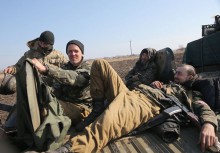Ukrainian TV screens are showing more and more documentary essays and chronicles about the exploits of our military in the east, their service at checkpoints, and their everyday life. But documentarians at the 1st National Channel recently showed a film on something different – they tried to make a generalized psychological, spiritual, moral, and philosophical portrait of man in war and show his unbreakable inner strength. The project of making an overall “portrait” of a serviceman brought forth a documentary film, I Am War (director Snizhana Potapchuk, camerawoman Svitlana Koval). After this picture had drawn a wide response, the film crew went on to continue this project, planning to make two more films on the same subject.
“We filmed the war from the very beginning of it. We’ve been in the ATO zone since May 23, 2014. At first I went there with the camerawoman Anna Kudriavtseva, and now I do so with Svitlana Koval. Sometimes I went there alone,” says the film director Snizhana Potapchuk in a comment to The Day. “It is not we who determine the genre in this case. I like figurativeness, vagueness, and poetic style in documentary cinema. But this is not about the Donbas situation. It is important to mind the time, place, and circumstances. From the very outset of the counterterrorism operation, we were trying to deeply penetrate into and understand the nature of this process. This in fact forms the concept and eventually the image of a future film. At first we recorded on camera almost all that we could see. Sometimes we had to use a hidden camera. Then all this went on the air. The material, i.e. the notes of a documentarian, determined the form and genre of presentation. But now we feel that we can discuss with the viewer not only some visible things, but also such a topic as man in war. For me, it is the most important and topical idea, although it is more difficult to implement it.”
Snizhana says the military were at first not too willing to enter into contact with the film crew, but when they came to know them better and understood the importance of TV documenting all that was going on at the front, they even made friends with the documentarians.
“Over almost 10 months in the ATO zone, we have met and struck up a friendship with many officers and soldiers. We send season’s greetings to each other. We often talk on the phone. We meet in a peaceful Ukraine,” Potapchuk continues. “The point is that we are not fulfilling a specific editorial task in the ATO zone, we have no limits or restrictions. We should, naturally, give credit to the channel management – fortunately, they are aware of the documentary film nature, and our hands are untied. This is extremely important for creative work. For us, a film hero is not a material, a bearer of the information we need, – he is, above all, a human being who has gone through something and should, in our view, share this with viewers, while we are just conveyors and transmitters. We deeply respect anyone whom our camera’s lens catches. The film includes about 20 interviews.”
Taking into account the natural difficulties of working on the front line, especially on a real battlefield, the crew of the TV film I Am War thanks the military for protecting their lives and health and for unflagging support.
“We have proved to our military, not without an effort, that they can trust us,” the director confesses. “We gather material not only for a concrete film but also for history. We record the Donbas events for the future. And even if something or somebody cannot be shown now, the viewer will see this in any case after the war or in umpteen years’ time.”







